The Gospel of the Greyhound in Sydney
Those that claim cigarette smoking is harmful to one's health have never had a hangover. My lighter and pack warmed my left shirt pocket while I sat in the back of the darkened presentation room, head turned to the ceiling and arms dropped to either side of my chair.
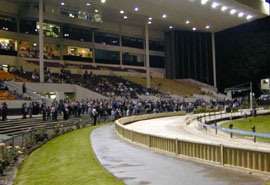 Junior reporter Junko stood at the screen in front. Her monthly slide report had something to do with the Japanese economy. The rest of the newsroom staff watched dutifully from their chairs.
Junior reporter Junko stood at the screen in front. Her monthly slide report had something to do with the Japanese economy. The rest of the newsroom staff watched dutifully from their chairs.
I shifted my gaze forward and saw her pointing at graphs indicating deflationary spirals, insufficient demand to match large supplies, and other such nonsense. The rising drama in the tone of her voice indicated that she was about to finish. My turn was next. For which, I knew I was going to need a little crutch.
I popped a grit into my mouth. Then with my alight lighter inches from ignition, Junko dropped her pointing stick to her right side and barked, "No smoking during this presentation!" The staff all pivoted their heads simultaneously to face me. At that, I eased my thumb off the gas lever until the point of my incrimination returned to its canister. I smiled. They all returned to their forward position.
Junko shut off the projector and the lights came on to a modest, but steady, round of applause. I slowly got up from my seat and made my way forward. As we passed, Junko said, "I hope you can keep your drunken exploits to a minimum."
At the podium, I slowly rolled up both my white shirtsleeves and completed the previously interrupted procedure with exaggerated motions of the hands - a sign that the baton of control had been passed. I then took two heavy puffs and began.
"There's some smaller ones here and there'll probably be two big fellows here tonight that can take bigger bets," says 32-year old Darren from Sydney, making his first trip to the Wentworth Park greyhound track in about a year. He is talking about the number and size of the bookies that will be on hand for the night's action. Darren adds that in the old days there would be 12 bookies on hand with 8 of them of capable size to handle large bets. He is using this as a means of explaining the extent that greyhound gambling, at the track at least, has declined in Australia.
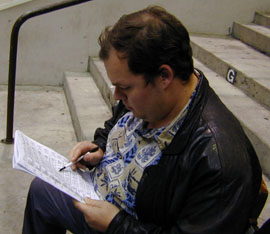 But make no mistake, gambling in Australia, as a whole, is not on the decline. It is just that the means has shifted over the past 30 years. Taking a stroll down to the local pub to play a few rounds of video poker or to the off-track parlor to lay a bet on a long shot has replaced the former sole outlets for the gambling jones (the horse and dog track) in days gone by.
But make no mistake, gambling in Australia, as a whole, is not on the decline. It is just that the means has shifted over the past 30 years. Taking a stroll down to the local pub to play a few rounds of video poker or to the off-track parlor to lay a bet on a long shot has replaced the former sole outlets for the gambling jones (the horse and dog track) in days gone by.
Some say gambling in Australia is part of the culture. Others say it is simply a means of enjoying a good day out. Whatever the reason, more people are doing it. Over the last ten years, gambling expenditure has increased in all states, mainly as a result of the legalization of gaming machines and an increase in the number of casinos (offering blackjack and roulette table games in addition to poker machines).
The Australian Institute for Gambling Research reports that in the year 2000 Australians wagered nearly AU $1,000 per capita on poker machines, racing, lotteries, and in casinos. By comparison Americans wager about half that annually. Such love of the action prompted the Sydney Morning Herald, in a feature about greyhound racing, to state that gambling in Australia "is religion."
Religion? As in worship? A thousand dollars a year per head might be one thing, but on a par with Christ? At the recent Sydney Cup, where race #7 brought AU $100,000 to the winner, Australian greyhound enthusiasts were happy to give their thoughts on gambling of all kinds while they looked for some winners.
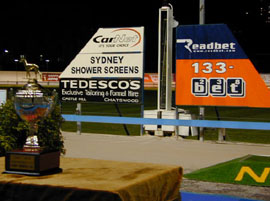 "They come together after the start - stupid bloody things - and then at the first turn they get unlocked. They kind of collide a lot so you want to get a dog that gets out in front so he doesn't run into another dog," says Ian Smith, a Sydney school teacher, of his strategy in picking a winning dog. He does this by studying the racing sheet to see how certain dogs have performed over their last races by checking tables marking a dog's place at each turn and stretch during the course of each eight-dog race.
"They come together after the start - stupid bloody things - and then at the first turn they get unlocked. They kind of collide a lot so you want to get a dog that gets out in front so he doesn't run into another dog," says Ian Smith, a Sydney school teacher, of his strategy in picking a winning dog. He does this by studying the racing sheet to see how certain dogs have performed over their last races by checking tables marking a dog's place at each turn and stretch during the course of each eight-dog race.
Ian is not sure if gambling is religion in Australia. But if it is, he says, Australians don't go to the same church anymore. Wentworth Park has been hosting greyhound races for 60 years and the folks aren't coming like they used to. "In '72 when I started [gambling on greyhounds]," he remembers, "this was packed [the area under the grandstands]. From end to end, rows of bookies. 40 or 50 on each side and to get a bet on you'd be pushing through people. You'd see 2:1 on a dog there [one bookie] and another [bookie] is 5:2 and you'd rush to try to get that one [5:2]. It is amazing how it's changed. They built this big stadium expecting the people to come. You go out there tonight and look up - and this is a big night - and there'll be nobody. It used to be packed."
Statistics from the Institute confirm his assertion. The once dominant racing industry now commands a mere 13% of all gambling action with poker machines outside of casinos taking more than half.
Dog owner Graham Bowles, 56, finds this trend rather disquieting. "That is one of the biggest criminal things they've done - allowing poker machines in the hotels and pubs," he says, "They put their money in for a quick fix through poker machines and they get hooked on them."
He is also quick to affirm the religion claim. "It is pretty much," he says. "You talk about Australia. It really is a gambling nation." His wife Margaret concurs, "The average Australian knows how to gamble - how to go and put a bet on."
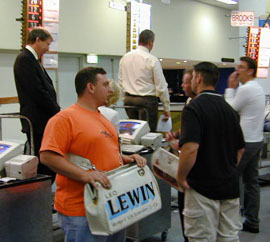 Their dog Montana Sky (named for his Margaret's love of John Denver) drew the eighth box (furthest outside position) in the third race. Margaret warns though that their dog "goes well from an inside box rather than an outside box because she's slow to start." Her admonition proves rather perceptive as Montana Sky finished fourth.
Their dog Montana Sky (named for his Margaret's love of John Denver) drew the eighth box (furthest outside position) in the third race. Margaret warns though that their dog "goes well from an inside box rather than an outside box because she's slow to start." Her admonition proves rather perceptive as Montana Sky finished fourth.
John Roberts, a dog owner for 26 years disagrees with the idea that gambling is religion but says, "There are very few countries where you can gamble like Australia." His wife Jenny confirms Australia's enthusiasm, saying of November's Melbourne Cup, "Whether it be 50 cents each way on a horse or you're in a local sweep, everybody in Australia will have some interest in one horse in the Melbourne Cup."
Tonight, their interest is the fifth race. Unlike Ian, she and her husband first look at the dog's position on the track in selecting a winner. "You bet on the position they draw in the race, the box they draw." The box their dog Fiasco drew was the fifth - or "the squeeze box," named for its central position in the track - and wound up finishing fourth.
But whether religion or not, most all see gambling's darker side - large losses and addiction - as becoming a real big problem for some people in Australia. "People just sit down [at the poker machines] and run through their wages," Graham says. He doesn't think the government will step in to help the situation much either. "As long as the government can get some tax out it," he says, "they don't care where it comes from."
Ian agrees with this sentiment, saying the increase in casinos and widespread poker machines have taken the fun out of gambling for some desperate people. "They seem to be really hooked on it," he says of casino gamblers. "I've seen a lot of guys get five dollars out of his wallet. You can tell it's all he's got. But he is getting five dollars out just to have one chip to have a bet. It's really sad in a way."
Still, most think it to be nothing more than recreation, rendering average losses of 20% to poker machines and 15% to off-track wagering outlets as nothing more than, say, a collection plate. "It's a good night out," Darren says. "I might lose $50. I might take home $100. Who knows? But I'm not going to be out there throwing out big amounts of money like some of the people do." Robert, 42, a builder, has a similar attitude, "It's the lifestyle of Australians. It's good country. It's good air, good environment. It's like a holiday all the time."
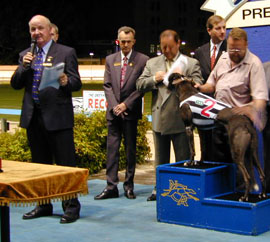 While Easter and Christmas holidays may come but once a year, worshippers can hear the gospel of the greyhound, at Wentworth Park anyway, every Monday and Saturday.
While Easter and Christmas holidays may come but once a year, worshippers can hear the gospel of the greyhound, at Wentworth Park anyway, every Monday and Saturday.
I stepped back from the podium and asked for questions. A single hand went up in the back. It was Junko's.
"Questions? I probably only have time for one." I scanned the room quickly. Junko started waving her hand. "Perhaps there is interest in my dog picking strategy?" I wondered. I waited and waited some more.
With no response, I started walking for the exit. Light applause began.
Junko stood, breaking the applause, and said: "Just a minute, mister! I thought you went to East Timor!"
Coming next week: East Timor after the Election

